

European entrepreneurs: Les misérables. The San Francisco Safety Net. At Mozilla and OSAF I worked on ancillary projects, projects that fed in to the development of the main product without being part of the main product itself.
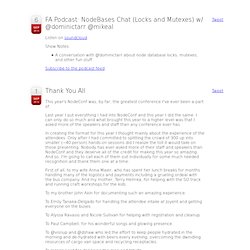
The most frustrating part for me was that while both the main product and my ancillary projects are open source they were hugely different in their needs and community. The main project is well funded, there are many people paid to work on it, and this injects continual investment in to that project, while my ancillary project is usually just me and in order to attract contributors I needed to understand how momentum works in community driven projects outside the walls of my employer. This made me more attentive to other projects, to what drives momentum and what discourages it.
How do you grow a project and what are the limitations? The earliest months of a project are the most important. Negativity comes in two flavors, internal and external. Every platform comes with a set of established patterns for compatibility. Believers vs non-believers. "I’d shut down Apple" - Michael Dell, 1997.
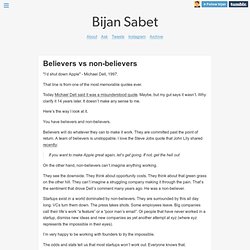
That line is from one of the most memorable quotes ever. Today Michael Dell said it was a misunderstood quote. Maybe, but my gut says it wasn’t. 'I Loved What I Did' It’s tolerably well known that newspapers and magazines bank the obituaries of the ailing famous.
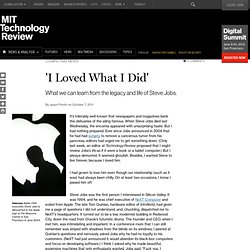
When Steve Jobs died last Wednesday, the encomia appeared with unsurprising haste. But I had nothing prepared.
Want to learn to code? Start here. Last September, I wrote a post called Want to learn Rails?
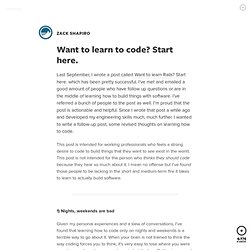
Start here. which has been pretty successful. Ferrari vs. xxx? No, I won’t be your technical co-founder. FollowBlog No, I won’t be your technical co-founder.

Don’t waste your time in crappy startup jobs. « Michael O.Church. What I’m about to say is true now, as of July 2012.

It wasn’t necessarily true 15 years ago, and it may not be true next year. Right now, for most people, it’s utterly correct– enough that I feel compelled to say it. The current VC-funded startup scene, which I’ve affectionately started calling “VC-istan”, is– not to be soft with it– a total waste of time for most of the people involved. Startups. For all the glamour and “sexiness” associated with the concept, the truth is that startups are no more and no less than what they sound like: new, growing businesses.
Now, the reverse seems to be true. Why I Left Google. ‘It takes courage to grow up and be who you really are.’ — e.e. cummings About 6 months ago, I decided to quit my very good job at Google to explore a different way to live life.

I had a loose plan of how I wanted to spend my time, but the main reason I left was that I couldn’t stay. I couldn’t put it into words at the time, but something inside of me was telling me I shouldn’t continue down the career path I was on. I felt strongly that it wasn’t getting me closer to where I wanted to be, though that destination was largely unknown, and I had to get off that road. Each month I stayed, I grew more anxious and, in turn, resentful. (1) Persistence: Who is the most persistent person who has ever lived. Ideas have a 2 week shelf life. Thumbs Up for Rock and Roll! Kid President. The Top Idea in Your Mind. July 2010 I realized recently that what one thinks about in the shower in the morning is more important than I'd thought.
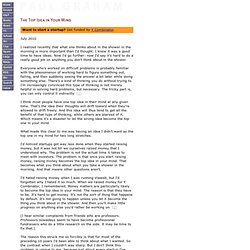
I knew it was a good time to have ideas. Now I'd go further: now I'd say it's hard to do a really good job on anything you don't think about in the shower. Everyone who's worked on difficult problems is probably familiar with the phenomenon of working hard to figure something out, failing, and then suddenly seeing the answer a bit later while doing something else. There's a kind of thinking you do without trying to. I Quit My Job Today - The Confused College Graduate - Quora. *Originally posted on July 30th, 2013 on my blog at Blog.
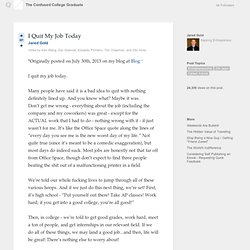
Steve Jobs: “Death Is The Destination We All Share” We’re going to go into whatever the blog equivalent of a moment of silence is here, because many of us are still staring at our computers shocked by the sad news of Steve Jobs’ death.
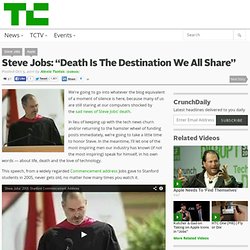
In lieu of keeping up with the tech news churn and/or returning to the hamster wheel of funding posts immediately, we’re going to take a little time to honor Steve. In the meantime, I’ll let one of the most inspiring men our industry has known (if not the most inspiring) speak for himself, in his own words — about life, death and the love of technology. This speech, from a widely regarded Commencement address Jobs gave to Stanford students in 2005, never gets old, no matter how many times you watch it. The Struggle. When Things Don't Work Out. I have said many times that early stage VC is a lot like baseball, if you get a hit one out of every three times, you are headed to the hall of fame. And if I look back over my career, and also over the track records of the firms and funds I have helped manage, that is pretty much the hit rate I have seen. By "hit" I mean an investment that returns 5x or better.
But of course, many of these hits return 10x or even 100x every once in a while. So what happens with the other two-thirds? Well that is the part of the startup world that we don't talk too much about. So what happens when things don't work out? The first is the "slog it out" scenario. In the "slog it out" sceanrio, the VCs are often left holding the bag. The second scenario is "hit the wall". Education: What's the most powerful/inspirational quote you've ever heard.
Can-Do vs. Can’t-Do Culture. “God, body and mind, food for the soul When you feeding on hate, you empty, my n! *$a, it shows.” — Rick Ross “The reasonable man adapts himself to the world; the unreasonable one persists in trying to adapt the world to himself. Therefore, all progress depends on the unreasonable man.” — George Bernard Shaw Lately, it has become in vogue to write articles, comments and tweets about everything that’s wrong with young technology companies. Hardly a day goes by where I don’t find something in my Twitter feed crowing about how a startup that has hit a bump in the road is “fu&%@d,” or what an “as*h%le” a successful founder is, or what an utterly idiotic idea somebody’s company is.
It seems like there is a movement to replace today’s startup culture of hope and curiosity with one of smug superiority. Why does this matter? The word technology means “a better way of doing things.” At some level, it would seem logically impossible that anybody could ever improve anything. The Computer.